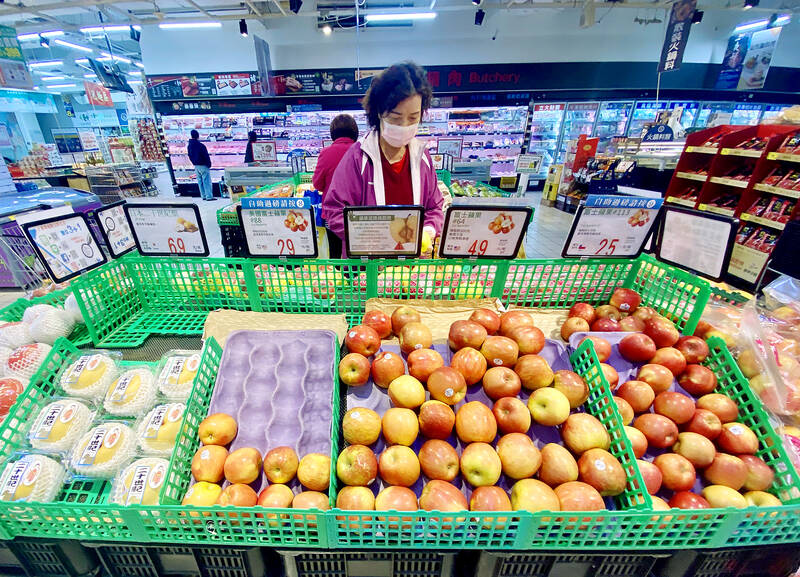The business climate monitor in December signaled “blue” for a second straight month, as exports, industrial output and other economic indicators contracted, while consumer spending gained traction, the National Development Council said yesterday.
The total score of nine monitoring indicators was unchanged at 12, reflecting a recession induced by global inflation and monetary tightening, council research director Wu Ming-huei (吳明蕙) said.
“Foreign trade, a key growth driver, would remain weak in the coming months, but might come out of the woods earlier as global inflationary pressures have showed signs of stabilizing,” Wu said.

Photo: CNA
The sub-index on retail, wholesale and dining revenue gained 1 point in December, but imports of electrical and machinery equipment retreated by the same pace, Wu said.
The council uses a five-color system to portray the nation’s economic health, with “green” signifying steady growth, “red” suggesting a boom and “blue” reflecting a recession. Dual colors suggest transition to a stronger or weaker state.
Rising inflation and interest rate hikes led consumers around the world to cut spending on technology gadgets, prompting major tech titans to shed headcount and manage inventory cautiously, the official said.
This might persist through the first half of this year, but a few steelmakers and electronics suppliers are expecting a turnaround next quarter, encouraged by China’s reopening and swift easing of COVID-19 restrictions.
The index of leading indicators, which projects the economic situation in the coming six months, weakened in December for the 13th straight month, albeit at a milder pace, Wu said, adding that the chance of a rebound is unlikely until the third quarter.
The index has declined 8.1 percent in the past 13 months, council data showed.
The index of coincident indicators, which reflects the current economic situation, shrank 2.08 percent to 92.06, as almost all constituent measures lost value except for the sub-index on non-farm payroll, the council said.
Service providers catering to domestic demand saw a rapid recovery in December, as companies held year-end banquets for employees, Wu said.
The momentum is expected to carry on into this month, as companies organize spring gatherings to celebrate the new year, he said.
In addition, demand for electronics used in high-performance computing, electric vehicles and emerging technology applications should thrive, while inventory corrections linger for smartphones and notebook computers, the council said.

South Korea’s equity benchmark yesterday crossed a new milestone just a month after surpassing the once-unthinkable 5,000 mark as surging global memory demand powers the country’s biggest chipmakers. The KOSPI advanced as much as 2.6 percent to a record 6,123, with Samsung Electronics Co and SK Hynix Inc each gaining more than 2 percent. With the benchmark now up 45 percent this year, South Korea’s stock market capitalization has also moved past France’s, following last month’s overtaking of Germany’s. Long overlooked by foreign funds, despite being undervalued, South Korean stocks have now emerged as clear winners in the global market. The so-called “artificial intelligence

NEW IDENTITY: Known for its software, India has expanded into hardware, with its semiconductor industry growing from US$38bn in 2023 to US$45bn to US$50bn India on Saturday inaugurated its first semiconductor assembly and test facility, a milestone in the government’s push to reduce dependence on foreign chipmakers and stake a claim in a sector dominated by China. Indian Prime Minister Narendra Modi opened US firm Micron Technology Inc’s semiconductor assembly, test and packaging unit in his home state of Gujarat, hailing the “dawn of a new era” for India’s technology ambitions. “When young Indians look back in the future, they will see this decade as the turning point in our tech future,” Modi told the event, which was broadcast on his YouTube channel. The plant would convert

‘SEISMIC SHIFT’: The researcher forecast there would be about 1.1 billion mobile shipments this year, down from 1.26 billion the prior year and erasing years of gains The global smartphone market is expected to contract 12.9 percent this year due to the unprecedented memorychip shortage, marking “a crisis like no other,” researcher International Data Corp (IDC) said. The new forecast, a dramatic revision down from earlier estimates, gives the latest accounting of the ongoing memory crunch that is affecting every corner of the electronics industry. The demand for advanced memory to power artificial intelligence (AI) tasks has drained global supply until well into next year and jeopardizes the business model of many smartphone makers. IDC forecast about 1.1 billion mobile shipments this year, down from 1.26 billion the prior

People stand in a Pokemon store in Tokyo on Thursday. One of the world highest-grossing franchises is celebrated its 30th anniversary yesterday.